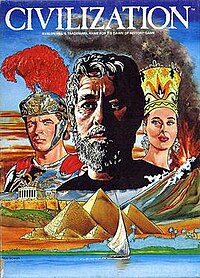Civilization (1980 board game)
|
2nd US version of Civilization
|
|
| Players | 2-7 |
|---|---|
| Age range | 15 years or older |
| Setup time | 15 minutes |
| Playing time | 3–12 hours |
| Random chance | Low |
| Skill(s) required | Strategy, tactics |
Civilization is a board game designed by Francis Tresham, published in the United Kingdom in 1980 by Hartland Trefoil (later by Gibsons Games), and in the US in 1981 by Avalon Hill. The game typically takes eight or more hours to play and is for two to seven players. The Civilization brand is now owned by Hasbro, but it is no longer published in the US.
Civilization is considered to be the first game ever to incorporate a technology tree (or "tech tree"), a common feature in subsequent board and video games, allowing players to gain certain items and abilities only after particular other items were obtained.
The Civilization board depicts areas around the Mediterranean Sea. The board is divided into many regions. Each player starts with a single population token, and attempts to grow and expand his empire over successive turns, trying to build the greatest civilization.
As each nation grows, adding more and more population to the board, players can build cities in regions they control. Each city grants a trade card to the owner, which allows trade with other players for any of eleven commodities, such as iron, grain and bronze. Along with trade come eight calamities such as volcanoes, famine and civil war, which destroy population and cities. Trade cards are combined in sets to purchase civilization cards, which grant special abilities and give bonuses toward future civilization card purchases. The civilization cards grant access to abilities such as agriculture, coinage, philosophy and medicine.
The goal of Civilization is to be first to advance to the final age on the Archaeological Succession Table (AST). The AST contains fifteen spaces, and players are advanced on the AST each turn. The AST starts at 8,000 B.C. and ends at 250 B.C. At several points, however, certain conditions must be met (such as, the civilization must have a certain number of cities) in order to advance. Since most civilizations do not meet the advancement criteria at all stages on the AST, games usually last more than fifteen turns.
...
Wikipedia

